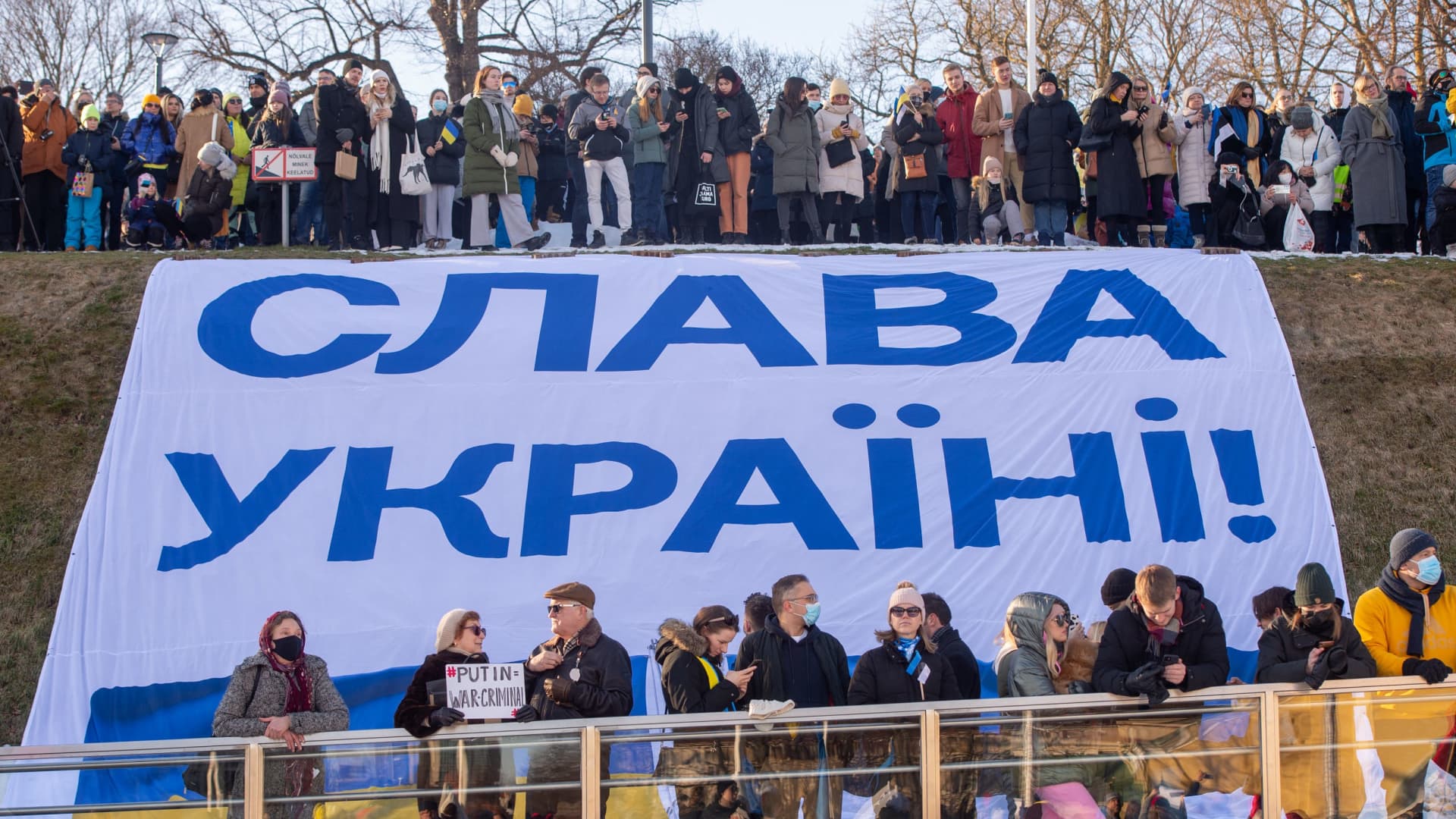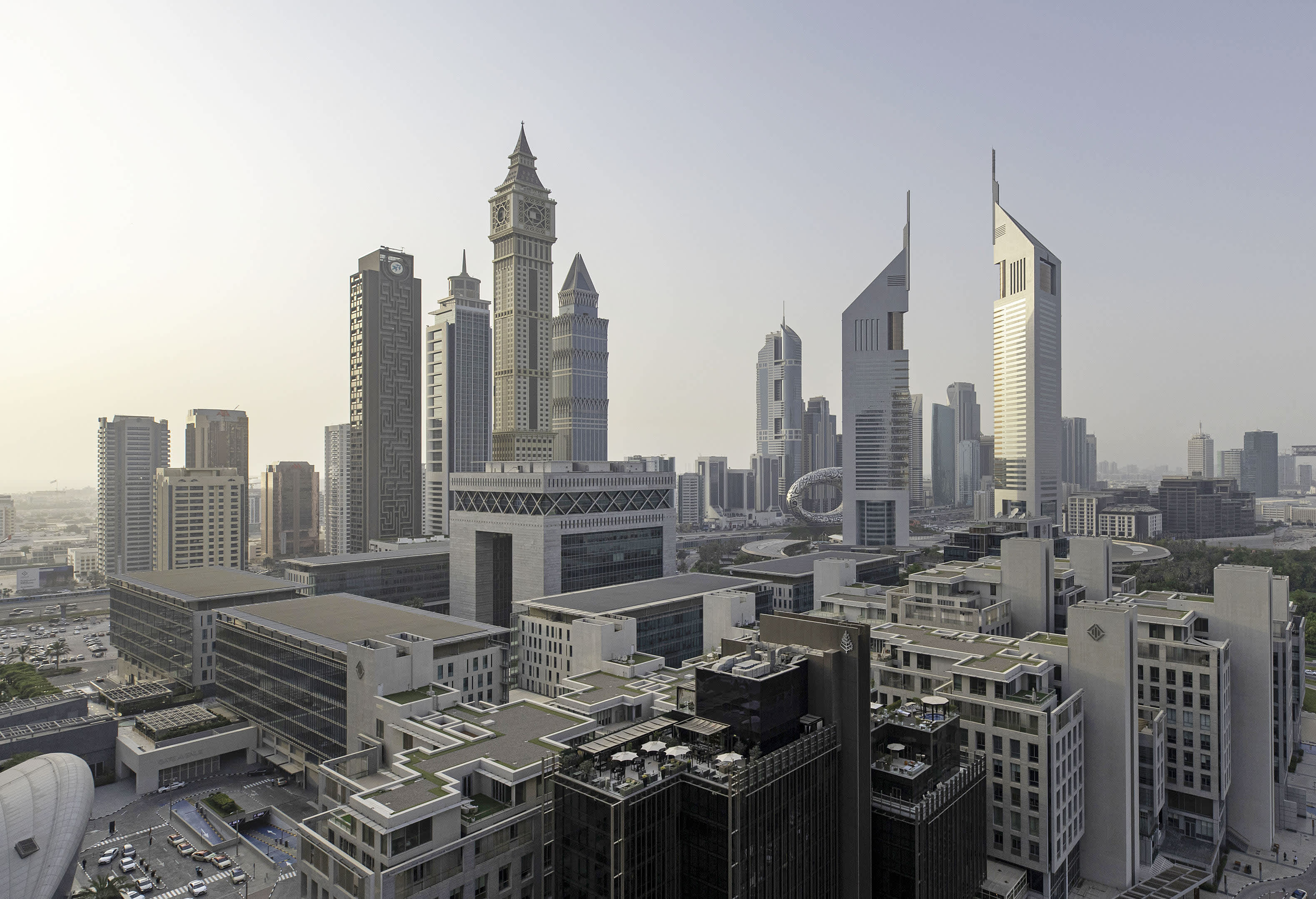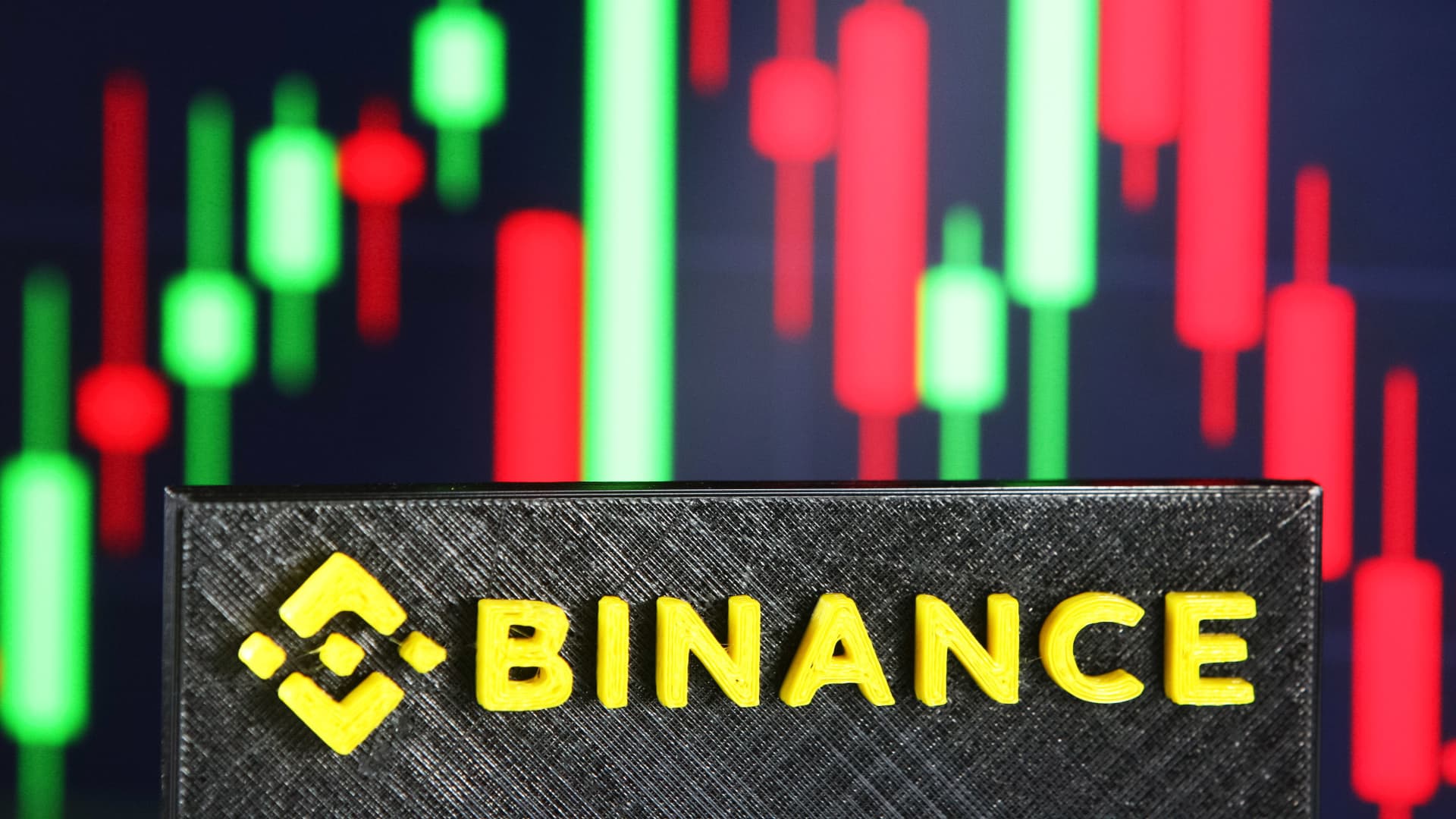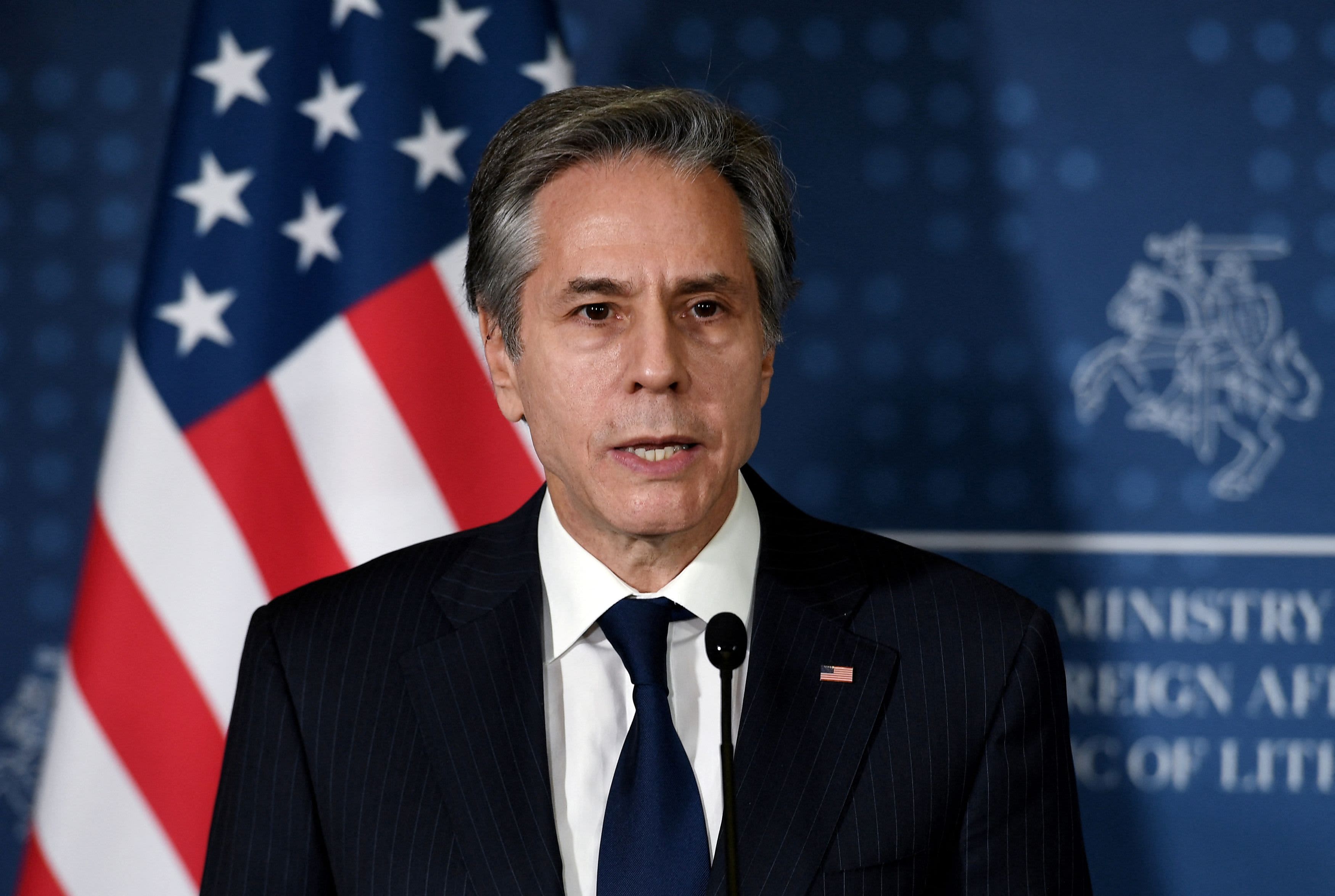The invasion of Ukraine has serious, unintended consequences for Russia. Here are just 5 of them
When Russia invaded Ukraine, it was widely believed to have expected an easy victory. But Moscow is facing unintended consequences of its aggression in Ukraine.

A banner that reads "Slava Ukraini" ("Glory to Ukraine, a Ukrainian national salute) in the backdrop of a demonstration in support of Ukraine on Freedom Square in Tallinn, Estonia, on Feb. 26, 2022, following Russia's invasion of Ukraine. While sympathy for Ukraine is rising in much of the world, the costs are mounting for Russia.
Raigo Pajula | Afp | Getty Images
When Russia invaded Ukraine, it was widely believed to have expected an easy victory over its neighbor.
But so far, Russia has little to show for what it has called its "special military operation": Its forces have been bogged down in fighting mainly on the northern, eastern and southern fringes of Ukraine and have found the country to be much more organized and well equipped than they expected.
Russian forces have seized only one city, Kherson, but even that occupation looks shaky, with Ukrainian forces launching a counteroffensive to retake the southern port. Similar moves have been seen elsewhere in Ukraine, with officials claiming its forces are mounting an increasing number of counterattacks.
Just over a month into the war, Moscow is facing unintended consequences of its aggression in Ukraine, ranging from high casualties among its troops to economic ruin for years to come.
Here are five of them:
1) Russian casualties are high
Russia has been coy about releasing statistics on its losses, but one Russian Defense Ministry official said Friday that 1,351 Russian soldiers had died in the war so far, and that 3,825 were injured.
Ukraine's authorities claim that more than 15,000 Russian soldiers have been killed in the conflict, while a senior NATO official last week estimated that between 8,000 and 15,000 have been killed.
Ukrainian soldiers salvage equipment from the body of a dead Russian soldier after a Russian vehicle was destroyed by Ukrainian forces near Sytnyaky, Ukraine, on March 3, 2022.
Marcus Yam | Los Angeles Times | Getty Images
If accurate, those numbers would be a heavy death toll for Russia — comparable to the almost 15,000 Soviet soldiers who died during the 10-year war in Afghanistan in the 1980s. To this day, that incursion is unpopular in Russia because it gained the country little but cost much blood.
To put the Russian forces' casualties in context, the United Nations' human rights office (OHCHR) said Tuesday that it has recorded a total of 1,151 deaths among Ukrainian civilians, including 54 children, and more than 1,800 injured civilians. It believes that the actual casualty figures are considerably higher.
"Most of the civilian casualties recorded were caused by the use of explosive weapons with a wide impact area, including shelling from heavy artillery and multiple launch rocket systems, and missile and air strikes," the OHCHR said.
2) Ukrainians now loathe Russia
One of the likely consequences of this war is that many Ukrainians will harbor an abiding animosity toward Russia, particularly after the bombing of homes and civilian infrastructure — including a children's hospital and maternity ward in Mariupol, as well as a theater where families were seeking shelter. These are widely seen as war crimes by the international community. Russia claims it has not targeted civilians.
Ukrainian President Volodymyr Zelenskyy summed up the mood in the country in early March when he stated that "we will not forgive, we will not forget, we will punish everyone who committed atrocities in this war on our land," before adding that "there will be no quiet place on this Earth except the grave."
A car burns after the destruction of a children's hospital in Mariupol on March 9, 2022, in this still image from a handout video obtained by Reuters.
Ukraine Military | via Reuters
Russian President Vladimir Putin has extolled the cultural, linguistic and historical ties between Russia and Ukraine, but he's driven what's likely to be a permanent wedge between the nations.
One member of the Ukrainian parliament, Kira Rudik, tweeted Monday that seeing Ukrainian homes burning as a result of Russian attacks "just makes us feel more rage" while another joined calls for reparations of $400 billion from Russia in order to rebuild Ukraine.
Putin has goaded Ukrainians in recent years, reiterating his belief that Ukraine is not "even a state" and that it's a historical part — and indeed a creation — of Russia, a claim he's made again in recent weeks.
A woman holds a child next to a destroyed bridge during an evacuation from Irpin, outside of Kyiv, Ukraine, on March 28, 2022.
Oleksandr Ratushniak | Reuters
Many Ukrainians, on the other hand, have spent much of the last two decades trying to assert its separateness from Russia, rejecting pro-Russian politics (and politicians) and instigating not one but two dramatic uprisings in 2004 and 2013. In the latter "Euromaidan" protests, thousands of Ukrainians braved police brutality and violent repression to call for political change, and for Ukraine to join the EU.
This ambition has only deepened under President Zelenskyy, who has asked the EU to fast-track Ukraine's accession to the bloc, while conceding that Ukraine might never join NATO — one of Moscow's intended consequences — as it looks to compromise in order to find a peace deal with Russia.
3) Economic ruin
The international community was accused of being slow and ineffective when Russia annexed Crimea from Ukraine in 2014. This time, it upped the ante when Russia's full-scale invasion began, with Western democracies imposing wide-ranging sanctions on key Russian sectors, businesses and individuals connected to the Kremlin or who support the invasion.
As a result, the Russian economy is expected to fall into a deep recession this year. The Institute of International Finance predicts Russia's economy will contract by as much as 15% in 2022 because of the war. It also predicted a decline of 3% in 2023 and warned in a note last week that the war "will wipe out fifteen years of economic growth."
Analysts at TS Lombard predict Russian citizens will experience a "serious hit" to living standards from the combination of recession and high inflation. The annualized inflation rate stood at 9.2% in February and is expected to have risen markedly higher in March, and there is "a plausible end-year range of 30-35%," Christopher Granville and Madina Khrustaleva said in a note Monday.
This, they added, may have important medium- to longer-term consequences, especially on a political level, with Putin's popularity likely to be tested as a result. They did, however, note one way Russia can mitigate the impact of sanctions on its economy: boosting its oil exports to China and India. Russia's oil-producing allies in OPEC are also standing by it.
4) Europe is dropping Russian energy
The war has also accelerated Europe's transition away from Russian energy imports, putting a large dent in the revenues Russia receives from energy exports.
It has also made the $11 billion Nord Stream 2 gas pipeline — designed to bring more Russian gas to Europe (and which the United States, Poland and Ukraine warned would increase the region's energy insecurity) — redundant, perhaps for good.
The landfall facilities of the Nord Stream 2 gas pipeline in Lubmin, Germany, on March 7, 2021. The Ukraine war has accelerated Europe's transition away from Russian energy imports and has made the $11 billion Nord Stream 2 gas pipeline redundant, perhaps for good.
Hannibal Hanschke | Reuters
The EU, which imported around 45% of its gas from Russia in 2021, has pledged to reduce its purchases of Russian gas by two-thirds before the end of the year, and the European Commission wants to stop buying Russian fossil fuels before 2030. In the meantime, the U.S. is looking to step into the breach by supplying its own liquefied natural gas to the region. The transition remains complex, however.
"We know that Europe allowed itself to become far too dependent on Russia [for energy] particularly Germany ... but it does take time to change sources of energy, it's not just a light switch you turn off overnight," Fred Kempe, president and CEO of the Atlantic Council, told CNBC. "An energy transition is a transition and in that time you need oil and gas," he added.
5) Russia has united the West
During Putin's 22 years or so in power, he has systematically and repeatedly tried to weaken and undermine the West, whether it has been interference in democratic processes in the U.S. (with the 2016 election) and Europe (with the funding of right-wing political groups) or serious incidents such as the alleged use of nerve agents against his personal and political enemies.
Military personnel wearing protective suits remove a police car and other vehicles from a public car park as they continue investigations into the poisoning of Sergei Skripal on March 11, 2018 in Salisbury, England.
Chris J Ratcliffe/Getty Images
Experts think Putin likely expected his invasion of Ukraine to have a disunifying effect on the West, with countries unable to agree on sanctions, or sending arms to Ukraine, but the opposite has proven true.
"The West's reaction is unprecedented. It is beyond anyone could have anticipated — united and much more than anyone in Russia was preparing or prepared for," Anton Barbashin, a political analyst and editorial director of the journal Riddle Russia, told CNBC.
"Essentially it is the ultimate economic warfare that will destroy Russia's economy as we know [it]. Will those sanctions deter Putin's war in Ukraine – no, but it will certainly considerably limit the time we have with Putin's Russia as it is today," Barbashin added.

 KickT
KickT 































